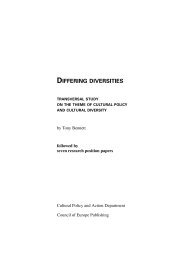Why we need European cultural policies: the impact of EU ...
Why we need European cultural policies: the impact of EU ...
Why we need European cultural policies: the impact of EU ...
You also want an ePaper? Increase the reach of your titles
YUMPU automatically turns print PDFs into web optimized ePapers that Google loves.
Changes in taxation <strong>policies</strong> <strong>we</strong>re necessitated by several reasons: demands from <strong>the</strong> <strong>European</strong>Union to harmonize with <strong>the</strong> acquis communautaire, because <strong>of</strong> policy transfer, or simply attemptsto apply models that <strong>of</strong>fered good results in o<strong>the</strong>r countries. Reports from <strong>the</strong> questionnaireabout <strong>the</strong> relevance <strong>of</strong> <strong>the</strong>se changes for culture included both positive and negative reactions.Ho<strong>we</strong>ver, responses about VAT sho<strong>we</strong>d something interesting. When <strong>the</strong> changes <strong>we</strong>re regardedas positive, <strong>the</strong>re was not much information, little research and it was difficult to extract data. If<strong>the</strong> change was perceived as negative, it was more visible, much easier to identify and more <strong>of</strong>tenquoted in various reports and discussion papers.The issue <strong>of</strong> tax policy has been directly linked with one <strong>of</strong> <strong>the</strong> topics being widely debated in<strong>cultural</strong> policy circles across Europe, mobility <strong>of</strong> artists and <strong>cultural</strong> workers. At <strong>the</strong> moment, <strong>the</strong>only incentive for mobility at an <strong>EU</strong> level is funding, targeted at encouraging mobility. Ho<strong>we</strong>ver,<strong>the</strong>re is evidence that action also <strong>need</strong>s to be taken at a policy level, for example harmonizingtaxation or social security to reduce <strong>the</strong>se types <strong>of</strong> barriers to mobility.In <strong>the</strong> run-up to accession, when tax policy was being reformed, <strong>cultural</strong> aspects <strong>we</strong>re notspecifically considered. It was reported that <strong>the</strong> <strong>impact</strong> on <strong>cultural</strong> policy was taking place mostlyas a side-effect <strong>of</strong> broader changes in tax laws. Also, this question has been perceived almostexclusively as an internal question. None <strong>of</strong> <strong>the</strong> literature nor <strong>the</strong> respondents (except for Slovenia)linked taxation policy to <strong>the</strong> issue <strong>of</strong> facilitating mobility and <strong>cultural</strong> cooperation within Europe.Nei<strong>the</strong>r did <strong>the</strong> changes which took place in new member states’ social security regulations – alsovery important for mobility – take into account culture and <strong>cultural</strong> cooperation. Social securityhas not been a matter <strong>need</strong>ing to be harmonized, it is up to individual member states and <strong>the</strong>rewas little coordination in <strong>the</strong> drawing up <strong>of</strong> new laws. Tax and social security regulations affectingartists still vary greatly.Lately, <strong>the</strong>re have been several judgments at <strong>the</strong> <strong>European</strong> Court <strong>of</strong> Justice which referred directlyand indirectly to mobility within <strong>the</strong> internal market.93 The adjudicated topics included artists’taxation and payment <strong>of</strong> social and health benefits in different <strong>EU</strong> member states. Some countrieshave taken account <strong>of</strong> <strong>the</strong>se rulings while some have completely ignored <strong>the</strong>ir implications.94The questionnaire also focussed on competition rules and legislation regarding free movement <strong>of</strong>goods. Responses indicated that, so far, very few changes relevant for <strong>cultural</strong> policy in <strong>the</strong> newmember states have resulted from harmonizing rules about competition and state aid. This wasnot really perceived as an issue even in old member states 95 until <strong>the</strong> <strong>European</strong> Commissionstarted interpreting some <strong>cultural</strong> policy measures as contrary to <strong>the</strong> rules. It is likely that with <strong>the</strong>streng<strong>the</strong>ning <strong>of</strong> institutions and implementation <strong>of</strong> <strong>the</strong> rules, some regulations <strong>of</strong> <strong>the</strong> new memberstates will be challenged.64Part 2 Preliminary assessment <strong>of</strong> <strong>the</strong> <strong>impact</strong> <strong>of</strong> <strong>EU</strong> enlargement














